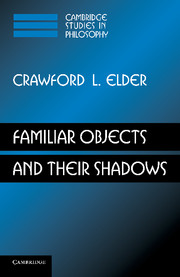Book contents
- Frontmatter
- Contents
- Acknowledgments
- Introduction
- 1 Two false friends of an ontology of familiar objects
- 2 Conventionalism as ontological relativism
- 3 Realism about material objects: persistence, persistence conditions, and natural kinds
- 4 Ontological preference for the temporally small
- 5 Ontological preference for microphysical causes
- 6 Ontological preference for the spatially small
- 7 A third false friend of familiar objects: universal mereological composition
- 8 Concluding Hegelian postscript
- Appendix: “Mutually interfering” dimensions of difference
- References
- Index
5 - Ontological preference for microphysical causes
Published online by Cambridge University Press: 25 January 2011
- Frontmatter
- Contents
- Acknowledgments
- Introduction
- 1 Two false friends of an ontology of familiar objects
- 2 Conventionalism as ontological relativism
- 3 Realism about material objects: persistence, persistence conditions, and natural kinds
- 4 Ontological preference for the temporally small
- 5 Ontological preference for microphysical causes
- 6 Ontological preference for the spatially small
- 7 A third false friend of familiar objects: universal mereological composition
- 8 Concluding Hegelian postscript
- Appendix: “Mutually interfering” dimensions of difference
- References
- Index
Summary
Might it be held that the microparticles that occupy the volume in which common sense supposes a familiar object to be present really cause anything that the familiar object appears to cause? That is what causal exclusion arguments contend. In this chapter I focus on what most philosophers would consider the most eminently excludable case of putative causation by a familiar object, namely mental causation – the case in which it appears that a person's beliefs and desires bring about some behavioral outcome. I argue that mental causation appears to be genuine causation, and that no there is no cause at all, at the level of small entities within the person, that can be held to bring about the same outcome. The argument against causal exclusion readily generalizes to other cases of apparent causation by familiar objects, in ways that I shall indicate, both here and in chapter 6.
THREE THREATS TO MENTAL CAUSATION
Can we vindicate the common-sense conviction that a person's mental states, and in particular her beliefs and desires, are causally efficacious – that they shape that person's behavior? Three obstacles appear to stand in the way. The first is the idea that any true causing must instantiate some exceptionless law. For it seems clear that the closest we can come to laws that link beliefs and desires to behavioral outcomes are mere generalizations that must be hedged by ceteris paribus clauses.
- Type
- Chapter
- Information
- Familiar Objects and their Shadows , pp. 88 - 113Publisher: Cambridge University PressPrint publication year: 2011



